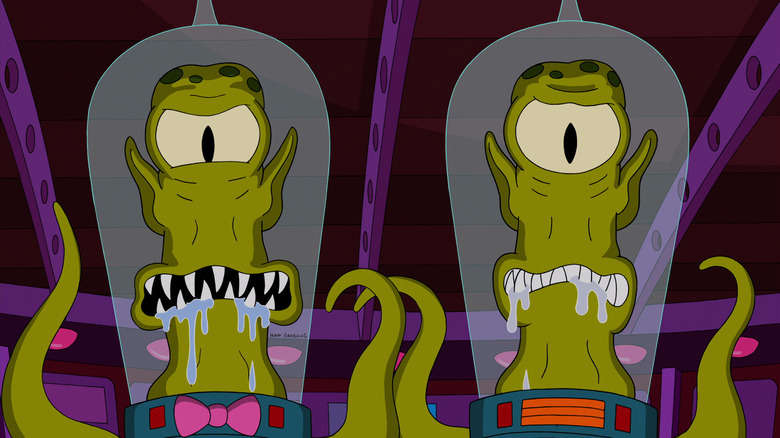The Simpsons Was Never Supposed To Run For More Than 13 Episodes
A rather amusing headline in a 2008 issue of The Onion read "Some Old Man Still Churning Out Marmaduke." The joke of the article was that Brad Anderson, then 83, the creator of the long-running dog-centric newspaper strip, was toiling away at his 20,000th monotonous "Marmaduke" comic in complete obscurity. Despite being a staple of the funny papers since 1953, much of Marmaduke's audience had long since ceased paying attention. Incidentally, Anderson continued to draw "Marmaduke" until his death in 2015 at the age of 91. The strip continues under the eye of Paul Anderson, his son.
Matt Groening's "The Simpsons" is — a more cynical critic might say — slowly approaching "Marmaduke" levels of tedium. There are now 34 seasons of "The Simpsons" to contend with, translating to 728 episodes, with more on the way. Evidently the show is hoping to live up to the promise made in "Three Men and a Comic Book" (April 30, 1992) wherein Bart (Nancy Cartwright) announced "Quality, schmality. If I had a TV show, I'd run that sucker into the ground." Many of us who recall the 1989 debut of "The Simpsons," or even its early days as a brief animated segment on "The Tracy Ullman Show," are likely watching in utter fascination, waiting for the moment when "The Simpsons" finally shows a sign of slowing. Like superhero cinema, many have been awaiting its demise, only to witness twentieth, thirtieth, and fortieth winds.
As such, it feels supremely odd to learn that "The Simpsons," back at the start, was initially planned to run only as a single-season novelty. In a 2022 GQ article on the show's longevity, producer James L. Brooks recalls being cornered at a party by animator David Silverman and being convinced to expand the show beyond a mere 13 episodes.
The early days of Fox
While 20th Century Fox was founded in 1935, the Fox Network didn't come into being until 1986, only a few years after now-91-year-old Australian media magnate Rupert Murdoch took over the broadcast arm of the company. In those early days, Fox was eager to establish an identity, and they threw many shows against the wall to see what would stick. "21 Jump Street" was a hit for them in 1987, as was "Alien Nation" in 1989. Fox expanded the Nickelodeon series "Double Dare" into the network-friendly "Family Double Dare," and they moved into the late-night competition with the Joan Rivers-hosted "The Late Show." In sitcoms, they introduced the world to "Married... With Children," and their biggest cash cow was the cheap-to-produce and ultra-salacious reality show "Cops," which ran for 14 years.
"The Tracy Ullman Show" was a big hit in the early days of Fox, and that show would occasionally run a "Simpsons" animated segment created by Groening, then best known for his long-running "Life in Hell" comic strip, which debuted in 1977. "The Simpsons" was considered edgy and daring at the time, being so bold as to depict a sitcom family as gross, a little dumb, and mildly obscene; It may be the first time one would hear cartoon characters say, "Damn." In the environment of growth and trying things out, producer James L. Brooks wanted to expand "The Simpsons" into a series.
13 and out
But "The Simpsons" was only meant to be a limited series. Sam Simon, another one of the show's head producers, saw "The Simpsons" as an experiment. Animated primetime sitcoms weren't common, and Simon seemed more interested in testing the waters than he was in creating a long-running phenomenon. In the GQ article, Brooks recalls the moment that he was approached at a party by a rather intoxicated Silverman who wanted to convince Brooks that "The Simpsons" could be so, so much more. Brooks claimed that he was convinced in that moment:
"He got drunk, pinned me against the wall, and told me passionately how much he felt that we had a chance to be a half-hour show, how there hadn't been one in 25 years, and how important it would be for animation.
Silverman also recalls the moment, but admits that he was indeed a little aggressive on the night in question. "It was a key moment for me," he said "It put this kind of religious thing in it. I might have gotten a little carried away. I'm glad I spoke up."
"The Flintstones" was an enormous hit 25 years before, and it was the first animated primetime sitcom in history. That show had debuted way back in 1960, and the only other primetime animated shows to have come alone in the interim were "The Jetsons," "Johnny Quest," and the wholly obscure three-episode wonder "Jokebook." Hence why Silverman was so passionate. This was, he felt, an opportunity to properly revive the animated primetime show.
History has proven it worked. Not only has "The Simpsons" run for more than three decades, it spawned a new successful subgenre of television that includes "The Critic," "Family Guy," and "King of the Hill." One may titter at its Marmaduke tedium, but "The Simpsons" will always be significant.


